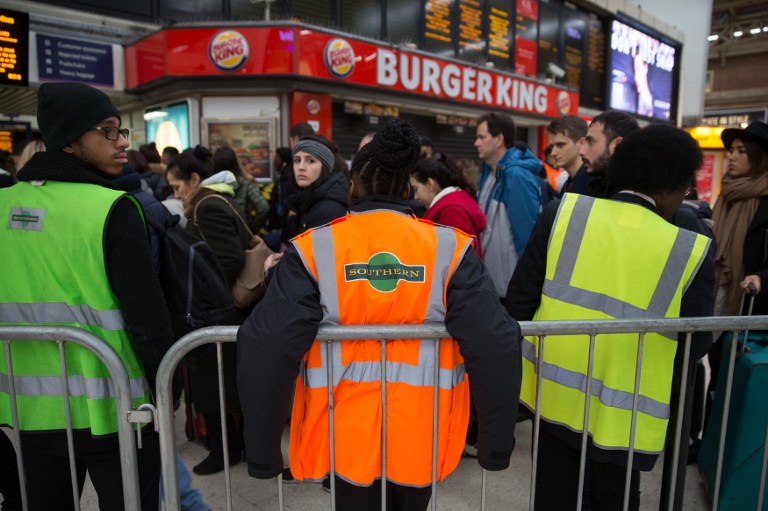
Hundreds of thousands of commuters were today left stranded for the third day this week after staff on Southern Rail, which runs trains from southern England into London, staged industrial action. / AFP PHOTO / DANIEL LEAL-OLIVAS
by Maureen COFFLARD
Agence France Presse
LONDON, United Kingdom (AFP) – From trains and planes to parcels, British workers are gearing for the festive season with a string of strikes, rounding off a year of action that began with an unprecedented walkout by doctors.
Hundreds of thousands of commuters were on Friday left stranded for the third day this week after staff on Southern Rail, which runs trains from southern England into London, stopped work.
The strike heaped pressure on London’s already overcrowded Tube and bus network and hit train services to one of the capital’s main airports, Gatwick.
Air travellers also face the prospect of disruption after British Airways cabin crew voted to strike over pay.
They have not yet announced a date but the action could begin as early as December 21 — the date that many British schools finish for the Christmas holidays.
Meanwhile workers at the state-owned Post Office, which runs branches offering stamps, mail delivery and retail services, have announced five days of strikes starting on Monday.
The chaos caused by the rail strike has sparked strong criticism of Southern Rail’s management and the government, as well as the unions.
One lawmaker from Prime Minister Theresa May’s Conservative party has proposed tougher laws on taking industrial action on critical public infrastructure.
The government earlier this year passed a law requiring unions to have a ballot turnout of at least 50 percent before striking.
“We’ve already passed legislation to provide people with better protection from undemocratic industrial action, and we would keep under review how these measures are working in practice,” the prime minister’s spokeswoman said.
‘Taking on second jobs’
The rail dispute revolves around the company’s plan to change the role of train guards, giving drivers sole responsibility for operating the doors.
Southern Rail has promised the changes will not lead to job losses and guards will be freed up to help passengers, but the unions say the move puts passenger safety at risk.
The stand-off may spread to other rail services after the RMT union issued a warning about similar plans to introduce “driver-only operation” onto other lines.
Meanwhile at British Airways, almost 2,000 cabin crew, or more than one in seven, voted to strike in a long-running dispute over pay.
The Unite union says so-called “mixed fleet” cabin crew who joined the firm after 2010 are struggling with wages which are so low that some sleep in their cars between flights.
“Significant numbers of crew are taking on second jobs, many go to work unfit to fly because they can’t afford to be sick,” said Matt Smith, a Unite regional officer.
The union is yet to announce a strike date and called on BA to return to the negotiating table.
‘Attack’ on jobs
Those able to bypass the transport strikes may yet face another challenge to their festive preparations next week as staff at the Post Office walk out for five days in the runup to Christmas.
Andy Furey, assistant secretary at the CWU union, said the action was partly in protest at plans to privatise the service, which he called “an unprecedented attack” on pensions and job security.
Another strike planned for next week by delivery drivers for retail giant Argos was called off after a deal was reached in their dispute over pay.
Bookmakers are now seeking to profit from workers’ discontent, on Thursday publishing odds about the next sector to go on strike.
Top of the list are doctors, who staged a series of unprecedented strikes this year over working conditions and pay in the state-run National Health Service (NHS), followed by bus drivers, police and fire fighters.
“Glorious post-Brexit Britain is doing its best to give those French strikers a run for their money, and with Brits up and down the country experiencing misery we may as well try and make a few quid off the next group to join to the picket line,” said bookmakers Paddy Power.







